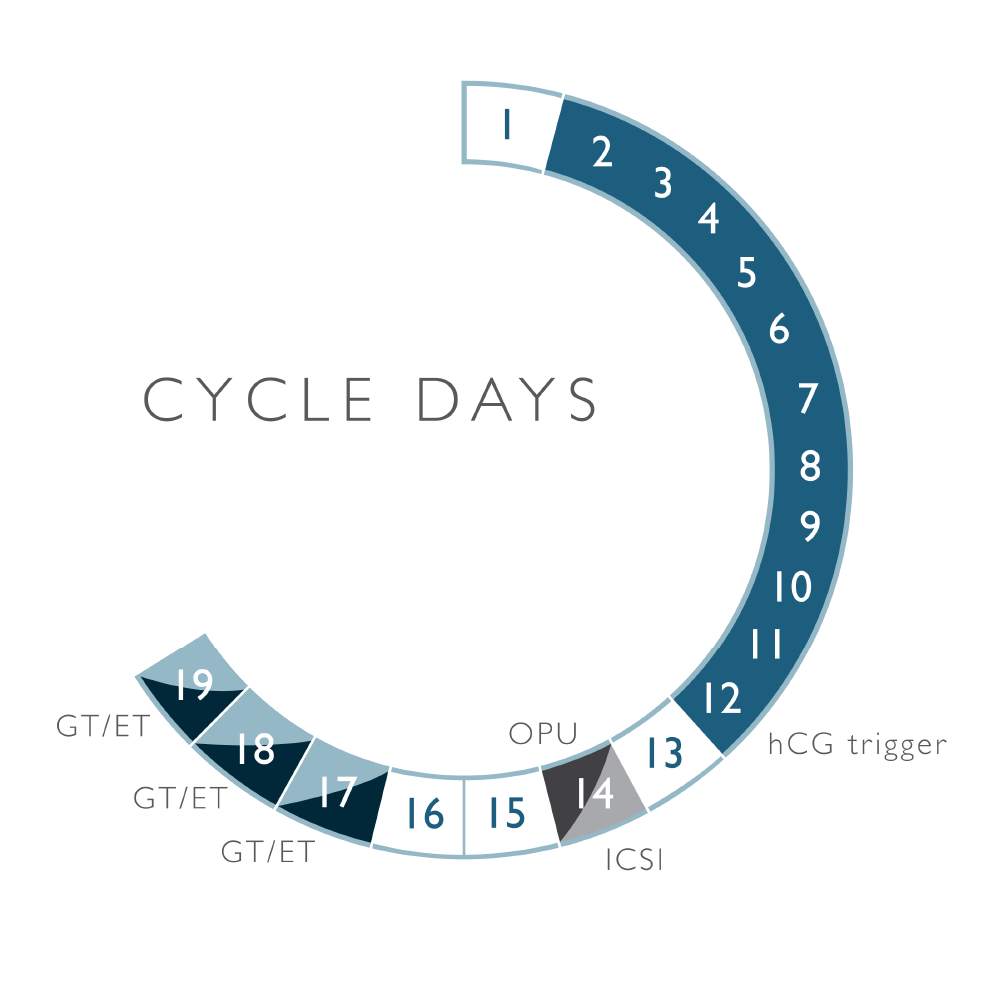Treatments
In Vitro Fertilization (IVF)
Intracytoplasmic Sperm Injection (ICSI)
In Vitro Fertilization (IVF) is the process of collecting eggs from a woman and sperm from a man, and fertilizing them in the embryology laboratory. In order to increase chances of fertilization, a single sperm is injected into each of the retrieved eggs using a micropipette in a process called Intra-Cytoplasmic Sperm Injection (ICSI).
What are the benefits of IVF-ICSI?
IVF-ICSI has been shown to improve the fertilization rate in a number of cases. It may be especially helpful for people suffering from:
- Previous failed fertilization
- Low sperm count
- Poor sperm motility
- High amount of abnormal sperm
- Retrograde ejaculation
- Vasectomy
- Immunological factors
- Other conditions that prevent fertilization of the egg
What are the steps and duration of an IVF-ICSI cycle?
During the initial consultation, one of IVF Michigan’s infertility specialists will take a full medical history and may perform a checkup that includes an ultrasound scan and blood tests to check hormonal levels. Based on the medical history and clinical exams, a personalized treatment plan is constructed. If the IVF specialist suspects that infertility may be attributed to a male factor, a semen analysis will be conducted before treatment, and the protocol will be altered as necessary.
Steps of IVF-ICSI (duration 21-25 days)
Ovarian Stimulation (7 to 10 days):
On day 2 or 3 of the menstrual cycle, medication is prescribed to stimulate the growth of multiple follicles in the ovaries. During this time, follicular growth is monitored through ultrasound as they develop into eggs, and hormone levels are tracked through blood tests. Medication protocols are changed as needed. 36 hours before the scheduled egg retrieval, a trigger shot(s) is given to induce maturation of the eggs within a scheduled timeframe.
Egg Retrieval (OPU):
Eggs are retrieved using a thin ultrasound-guided needle during a short procedure under sedation. The number of eggs retrieved depends on the body’s response to the medication.
Sperm Collection and ICSI:
On the day of egg retrieval, a semen sample is taken to fertilize the retrieved eggs. To increase chances of fertilization, a single sperm is injected into each egg using a micropipette in a method called ICSI.
Genetic Testing (optional):
If Pre-Implantation Genetic Testing (PGT) or Pre-Implantation Genetic Testing Diagnosis (PGT-M) will be completed to help prevent passing on a hereditary disease, 3 to 5 days after the egg retrieval, a biopsy is taken of each embryo. The embryos will then be transferred to the uterus during a future cycle.
Embryo Transfer:
Embryo transfer is a minor procedure that does not require sedation. Following the procedure, hormone levels are tracked through blood test to confirm pregnancy. Any embryos that are not transferred may be frozen and used in a future cycle.

*The above dates are an approximation of an average cycle.
Will every fertilized egg develop into a healthy embryo?
It is important to understand that not every egg collected will fertilize and develop into a viable embryo. It is common to have a variation of embryo stages and grades in embryos at any point after fertilization. After the eggs are fertilized, the embryologists will continue to assess the quality of the embryos.
Should I be considering IVF-ICSI? Do I have other options?
Each couple is unique and it is important to discuss your full medical history with an infertility specialist before making a decision. IVF Michigan Fertility Center is aware that experiencing difficulty in conceiving can be stressful, emotionally and financially, and we will do our part to help you and your partner fulfill your dreams of parenthood.
